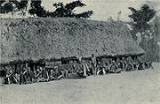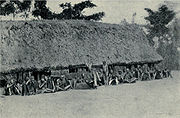
List of rulers of Nri
Encyclopedia
The following is a list of rulers of Nri. The title of the ruler of Nri is eze Nri. The eze
held religious and political authority over the Kingdom of Nri
in a fashion comparable with that of the pope
. The Nri culture is believed to stretch back to around the 10th century, however, its recorded kings goes back to the early 13th century. The power of the eze Nri and the kingdom as a whole ended in 1911 with the last independent monarch being forced to submit to British rule at gunpoint. Nevertheless, the title of eze Nri has survived into the 21st century.
used to make the ritual pot (odudu) for the shrine to Nri Menri. After various other rituals such as causing the magical ripening of a fruit palm and undergoing a ritual burial and reviving, the eze Nri was proclaimed and saluted as igwe (meaning "heavenly one").
948-1041 || || || ||
|}
1043-1089 || || || ||
|-
| Eze Nri Nàmóke
1090-1158 |||| Diodo ||||
|-
| Eze Nri Buífè
1159-1259 |||| Obeagụ Unified Ọfọ N’alọ Agukwu and Diodo ||||
|-
| Eze Nri Ọmalọ
1260–1299 |||| Uruọji ||||
|-
| Eze Nri Jiọfọ I
1300-1390 |||| Uruọji ||||
|-
| Eze Nri Ọmalonyeso
1391-1464 |||| Obeagu ||||
|-
| Eze Nri Anyamata
1465-1511 |||| Uruọji ||||
|-
| Eze Nri Fenenu
1512-1582 |||| Agbadana ||||
|-
| Eze Nri Agụ
1583-1676 |||| Obeagu ||||
|-
| Eze Nri Apia and Nri–Alike
1677-1700 |||| Both from Uruọji |||| Both died the same day
|-
| Eze Nri Ezimilo
1701-1723 |||| Agbadana |||| Assassinated
|-
| Eze Nri Èwenétem
1724-1794 |||| Agbadana ||||
|-
| Eze Nri Ènweleána I
1795-1886 |||| Obeagu ||||
|-
| Eze Nri Òbalíke
1889-1936 || || Uruoji ||||
|| Uruoji ||||
|}
1937-1987 |||| Agbadana ||||
|-
| Eze Nri Ènweleána II Obidiegwu Onyeso
(MFR)
1988-current |||| Obeagu ||||
|}
Eze
Eze is an Igbo word which means King; with further implied meaning of chieftain of the tribe or kingdom. Such words as Igwe and Obi plus others are used by Igbo people as titles of respect and homage to the Eze...
held religious and political authority over the Kingdom of Nri
Kingdom of Nri
The Kingdom of Nri was the West African medieval state of the Nri-Igbo, a subgroup of the Igbo people, and is the oldest kingdom in Nigeria. The Kingdom of Nri was unusual in the history of world government in that its leader exercised no military power over his subjects...
in a fashion comparable with that of the pope
Pope
The Pope is the Bishop of Rome, a position that makes him the leader of the worldwide Catholic Church . In the Catholic Church, the Pope is regarded as the successor of Saint Peter, the Apostle...
. The Nri culture is believed to stretch back to around the 10th century, however, its recorded kings goes back to the early 13th century. The power of the eze Nri and the kingdom as a whole ended in 1911 with the last independent monarch being forced to submit to British rule at gunpoint. Nevertheless, the title of eze Nri has survived into the 21st century.
Selection
The eze Nri was chosen by the Nze and Nzemabua (state leadership) and had to be recognized by the general public. Before being crowned, he could not have a living father. The potential eze Nri also had to prove he was the choice of God (Chukwu), Eri (founder of Nri), the ancestors ("ndiichie") and spirits (alusi) through revelations and visions confirmed by diviners. After this, he had to travel to Aguleri to obtain a lump of clay from the bottom of the Anambra RiverAnambra River
The Anambra River flows 210 km into the Niger River and is found in Anambra, Nigeria. The river is the most important feeder of the River Niger below Lokoja. The flow of the Anambra river is released into the Atlantic through various outlets forming the 25,000 km2 Niger Delta region....
used to make the ritual pot (odudu) for the shrine to Nri Menri. After various other rituals such as causing the magical ripening of a fruit palm and undergoing a ritual burial and reviving, the eze Nri was proclaimed and saluted as igwe (meaning "heavenly one").
Reigns
It is difficult to trace the exact dates for an individual eze Nri, because there was an interregnum after each one's death. During this time, the priests of the eze Nri waited for someone to manifest the signs indicating they were the next priest-king.Eri period
| EriEri (divine king)
Eri is said to be the original legendary cultural head of the Nri-Igbo, a subgroup of the Igbo people and Godfather of Igbo Civilization. From oral and recorded accounts, he is said to come down from the sky, having been sent by God . Eri settled and established in the middle of Anambra river...
948-1041 || || || ||
|}
Post Eri period
| Eze Nri ÌfikuánimEze Nri Ìfikuánim
Eze Nri Ìfikuánim, was the first king of the Nri Kingdom. According to Igbo oral tradition, his reign started in 1043, although at least one historian puts Ìfikuánim's reign much later, around 1225 AD.-References:...
1043-1089 || || || ||
|-
| Eze Nri Nàmóke
1090-1158 |||| Diodo ||||
|-
| Eze Nri Buífè
1159-1259 |||| Obeagụ Unified Ọfọ N’alọ Agukwu and Diodo ||||
|-
| Eze Nri Ọmalọ
1260–1299 |||| Uruọji ||||
|-
| Eze Nri Jiọfọ I
1300-1390 |||| Uruọji ||||
|-
| Eze Nri Ọmalonyeso
1391-1464 |||| Obeagu ||||
|-
| Eze Nri Anyamata
1465-1511 |||| Uruọji ||||
|-
| Eze Nri Fenenu
1512-1582 |||| Agbadana ||||
|-
| Eze Nri Agụ
1583-1676 |||| Obeagu ||||
|-
| Eze Nri Apia and Nri–Alike
1677-1700 |||| Both from Uruọji |||| Both died the same day
|-
| Eze Nri Ezimilo
1701-1723 |||| Agbadana |||| Assassinated
|-
| Eze Nri Èwenétem
1724-1794 |||| Agbadana ||||
|-
| Eze Nri Ènweleána I
1795-1886 |||| Obeagu ||||
|-
| Eze Nri Òbalíke
Eze Nri Òbalíke
Eze Nri Òbalíke is the 15th recorded Eze Nri of the Kingdom of Nri in modern day southeastern Nigeria. He is said to have ruled from around the year 1889 till 1936.- Nomination as Eze Nri :...
1889-1936 ||
 || Uruoji ||||
|| Uruoji |||||}
Post decline
| Eze Nri Jiọfọ II Taabansi Udene1937-1987 |||| Agbadana ||||
|-
| Eze Nri Ènweleána II Obidiegwu Onyeso
Eze Nri Ènweleána II Obidiegwu Onyeso
Eze Nri Ènweleána II Obidiegwu Onyeso is the 16th recorded, and present Eze Nri of the Kingdom of Nri in modern day southeastern Nigeria.- References :...
(MFR)
1988-current |||| Obeagu ||||
|}

